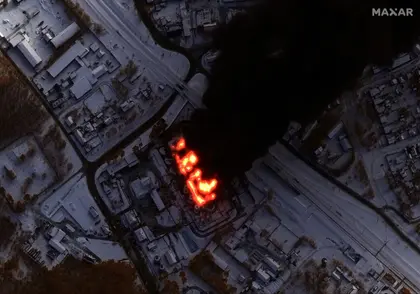- Ukraine drone strikes on Russian oil refineries reduce production
- Germany to provide additional €500 million in security assistance to Ukraine
- 20th Ramstein meeting sees alliance of more than 50 countries pledge weapons
- Sanctions imposed on Russia take bite on railway transport
Drone attacks are revolutionizing warfare, AFU commander says
“Unmanned attack systems are gradually becoming the main strike weapon of ground units in a combined military battle,” Ukraine’s military commander-in-chief Oleksandr Syrsky told the Ukrainian-language service of Radio Free Europe/Radio Liberty on Tuesday. “The confrontation between drones and EW [electronic warfare] has come to the fore, and the one who will be the first to achieve a breakthrough in this competition will have a chance to win.”
JOIN US ON TELEGRAM
Follow our coverage of the war on the @Kyivpost_official.
About half of Russia’s 30 largest oil refineries have been struck by Ukrainian drones since the beginning of the year.
Between 900,000 to 600,000 barrels of oil-refining capacity have been off-line due to unmanned vehicle strikes, Bloomberg news agency and JP Morgan bank said on Tuesday.
Russia suspended oil exports on March 1 due to the strikes, presumably to keep prices low at gasoline stations.
“If this is Kyiv’s plan, it’s similar to the tactics employed by Russia a year ago, when it targeted the Ukrainian power system, bombing transformers in the hope that repairs would take time,” said Sergey Vakulenko of the Carnegie Endowment for International Peace. “In the end, Ukraine managed to source enough spare parts, and come up with enough quick fixes that Russia’s campaign failed.”
Berlin announces it is supplying Ukraine with over $540 million worth of weaponry

EU Extends Sanctions on Russia After Hungary Ends Weeks of Resistance
Amid Kyiv’s shortage of heavy weaponry, German Defense Minister Boris Pistorius announced a package that includes 10,000 artillery shells, 100 armored vehicles and 100 logistical vehicles, according to state broadcaster Deutsche Welle.
20th Ramstein meeting sees alliance of more than 50 countries pledge weapons
A coalition of more than 50 countries and 32 member states of the North Atlantic Treaty Organization (NATO) pledged additional materiel to Kyiv as it staves off an unjustified Russian full-scale invasion that was launched on Feb. 24, 2022.
Taking place at the US military air force base in Ramstein, Germany for two years, US Defense Secretary Lloyd Austin said that “Ukraine will not back down in face of the Russian invasion of the country and neither will the United States.”
He added: “Ukraine is fighting for its life as a sovereign nation, and the Ukrainian military has been effective,” the Pentagon said in a statement. “Austin noted that Ukraine’s military has destroyed or damaged 20 medium-to-large Russian navy vessels.
Moscow has “wasted” more than $200 billion to “equip, deploy, maintain and sustain its needless war on its neighbor,” Austin said.
Mostly reliant on US weapons, Kyiv has urged Congress to move on approving more procurement of materiel as Ukraine’s armed forces have had to ration the use of heavy weaponry and lose territory to invading Russian forces.
Ukraine’s Defense Minister Rustem Umerov said on Facebook that the two-day Ramstein assembly took place as part of a separate meeting with Austin and Chairman of the Joint Chiefs of Staff Gen. CQ, Brown Jr.
“Today, our team had a separate meeting… They discussed the plan of Ukraine for 2024, the construction of fortifications, strengthening of Ukrainian air defense, and provision of means of radio-electronic warfare. Long-range weapons became a separate item,” Umerov said.
Western sanctions start to hurt Russian rail traffic
Nearly 50,000 trains run by the Russian state-owned railway company had to suspend or delay shipments last year, RailFrieght.com reported on Tuesday.
The reason is that restrictive measures imposed on Russia for war mongering are having an effect and causing trouble for Russian Railways to purchase “spare parts,” the railway industry publication said.
It’s also struggling with “a shortage of educated staff.”
You can also highlight the text and press Ctrl + Enter










